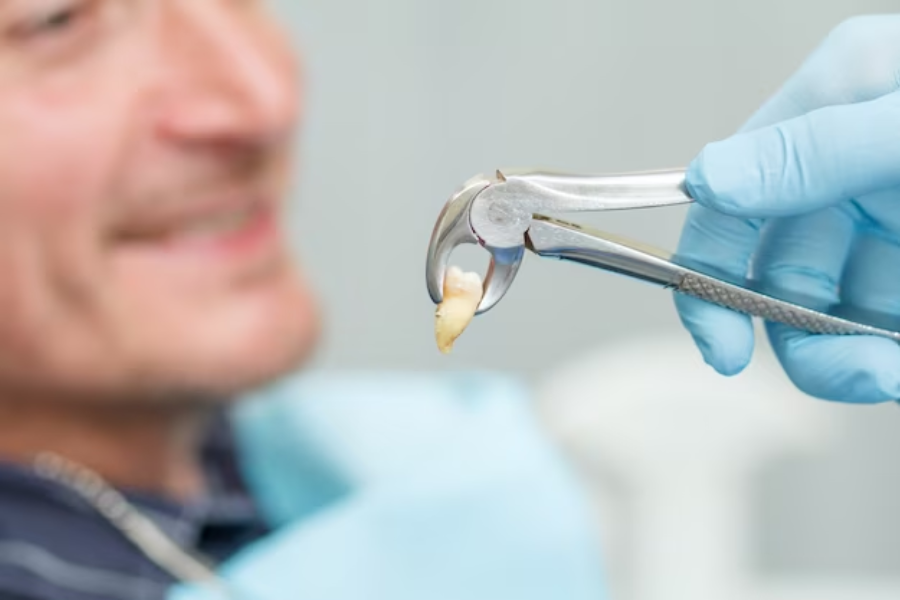
Our teeth are incredibly strong and resilient, but even they can’t withstand everything life throws our way. Sometimes, despite our best efforts at maintaining good oral hygiene, a tooth might become so damaged or compromised that saving it becomes impossible. In these situations, dentists may recommend tooth extraction as the most effective and beneficial course of action for your overall oral health. While the idea of losing a tooth can be unsettling, it’s important to understand that extraction is not always a bad thing. In many cases, it can be the key to preventing further complications, alleviating pain, and even improving your smile’s functionality and aesthetics. This blog delves into the five main reasons why tooth extraction might be the best option for you. It will also help you understand the rationale behind this dental procedure and make informed decisions about your oral health.
5 Reasons Why Tooth Extraction Might Be Necessary
While dentists always strive to preserve natural teeth whenever possible, there are situations where extraction becomes the recommended course of action to maintain oral health and well-being. Here’s a closer look at the common reasons why tooth extraction might be necessary:
#1: Severe Tooth Decay or Damage
Extensive Decay: When tooth decay, also known as cavities, progresses beyond the enamel and dentin layers, it reaches the inner pulp. As a result, it causes significant pain, infection, and swelling. If the decay is too extensive and cannot be effectively treated with a filling or root canal therapy, extraction becomes the only viable option to eliminate the infection. Also, it helps to prevent its spread to surrounding teeth and jawbone.
Fractures: Severe fractures that compromise the structural integrity of the tooth and cannot be repaired through procedures like crowns or onlays may necessitate extraction.
#2: Advanced Gum Disease
Progressive Infection: Periodontal disease, also referred to as gum disease, is an inflammatory condition that affects the gums and the bone supporting the teeth. In its advanced stages, the infection can progressively damage the gum tissue and bone, leading to loose teeth and, ultimately, tooth loss.
Protecting Remaining Teeth: When gum disease has reached a point where it cannot be controlled, and the affected tooth cannot be saved due to severe bone loss, extraction may be necessary. It helps to prevent further tooth loss and protect the health of remaining teeth.
#3: Impacted Wisdom Teeth
Lack of Space: Wisdom teeth, the third molars located furthest back in the jaw, often erupt later in life and may not have enough space to erupt properly. This can lead to impaction, where the wisdom tooth becomes trapped beneath the gum line or erupts at an abnormal angle, pushing against other teeth.
Potential Complications: Impacted wisdom teeth can cause various complications, including pain, infection, damage to surrounding teeth, and even the development of cysts or tumors. To prevent these issues, especially when they are causing problems or are unlikely to erupt correctly, dentists often recommend extracting impacted wisdom teeth.
#4: Overcrowding
- Jaw Size Disparity: In some cases, individuals may have jaws that are naturally too small to accommodate all their teeth comfortably. This overcrowding can lead to various problems, such as:
- Misaligned teeth: Teeth can become crooked, crowded, or rotated, affecting aesthetics and potentially making it difficult to clean them properly.
- Cleaning challenges: Overcrowding can make it harder to maintain proper oral hygiene, increasing the risk of developing cavities and gum disease.
- Improved Oral Health: To create space for proper alignment and improve overall oral health, dentists may recommend strategically extracting one or more teeth. It helps to allow teeth to shift into their correct positions through orthodontic treatment like braces or retainers.
#5: Preparation for Other Dental Procedures
In specific situations, tooth extraction might be required to facilitate other dental procedures. Extracting a tooth may be necessary to create space for the placement of a dental implant. It’s an artificial tooth root surgically embedded in the jawbone to support a crown, bridge, or denture. Also, extracting a tooth might be needed to create appropriate support for certain types of bridges and dental restorations that replace missing teeth by anchoring them to adjacent teeth.
Making the Decision: When to Extract and When to Save
The decision to extract a tooth is a significant one, impacting your oral health and overall well-being. This choice should always be made with time and is always determined by a qualified dentist after a comprehensive examination and patient-centered consultation. Here’s a deeper dive into the factors your dentist considers when making this recommendation:
Prioritizing Tooth Preservation
It’s crucial to understand that dentists prioritize saving your natural teeth whenever possible. They view natural teeth as invaluable, irreplaceable components of a healthy and functional oral system. This is why they will exhaust all other viable options before recommending extraction. These options may include:
- Fillings: Used to repair cavities or minor tooth fractures.
- Root canal therapy: Preserves a severely infected tooth by removing the infected pulp (inner tissue) and sealing the tooth.
- Periodontal treatments: Address gum disease, aiming to prevent tooth loosening and bone loss.
Factors Influencing the Decision
Several crucial factors come into play when deciding between saving and extracting a tooth. Your dentist will thoroughly evaluate:
The severity of the issue: This includes the extent of tooth decay, damage, or infection. In cases where the damage is extensive and beyond repair, extraction might be necessary to prevent further complications.
Surrounding teeth and bone: The dentist will assess the health of the surrounding teeth and jawbone. If saving the affected tooth compromises the health of neighboring teeth or the underlying bone, extraction might be the optimal choice.
Overall health: Your dentist will consider your overall health and medical history. Certain medical conditions or compromised immune systems might make saving a severely infected tooth a greater risk than extraction.
Desired aesthetic outcome: While functionality is paramount, your dentist will also consider your desired aesthetic outcome. If the tooth’s condition significantly impacts your smile, extraction might be combined with options like implants or bridges to achieve the desired appearance.
Losing a tooth can be an emotional experience, but understanding the reasons behind tooth extraction can empower you to make informed decisions about your oral health. While the procedure itself might sound daunting, modern dentistry utilizes advanced techniques and anesthesia to ensure a safe, comfortable, and minimally invasive experience. Remember, prioritizing your oral health is crucial for your overall well-being. By working closely with your dentist and understanding the various treatment options available, you can maintain a healthy smile and enjoy the benefits of good oral health for years to come.



